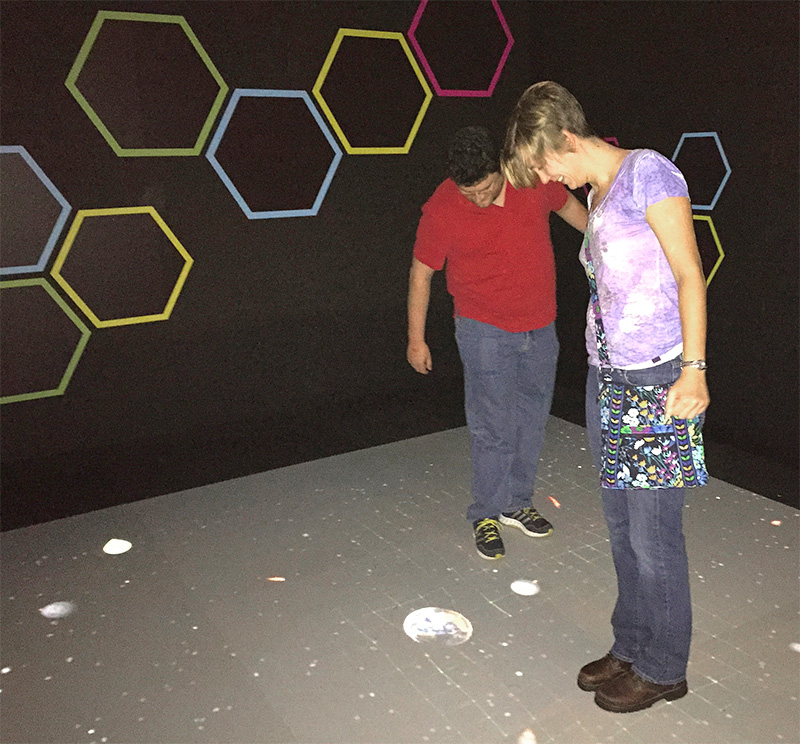
Players get pulled in to save the Earth from asteroids in “Gravity Defense.” In the interactive game designed by UT Dallas students, users move their bodies in an attempt to pull asteroids safely away from Earth.
Feral hogs are destroying local farms, colonies of bees are disappearing and giant asteroids are on a collision course with Earth. But there’s hope: You can help solve these problems by playing the newest video games developed by UT Dallas students.
The Perot Museum of Nature and Science and the University’s Arts and Technology (ATEC) program have collaborated during the past nine months to create a series of educational games that emphasize the importance of STEM fields — science, technology, engineering and mathematics. The results of this collaboration are on display in the Game Lab, a dedicated space in the Perot Museum that allows guests to play the games.
The games are intended to provide a fun, interactive learning experience that also enhances the understanding of science with simulations.
“Over the last several months, our teams have collaborated to create video games we believe can be fun, engaging platforms for exploring important real-world science topics,” said Steve Hinkley, vice president of programs for the Perot Museum of Nature and Science.

“Stop the Hogs” challenges players to prevent invading feral hogs from multiplying and devastating local farmlands.
“Through this project, our guests will experience the unique creations of some of the next generation’s brightest minds — and the UT Dallas students have an opportunity to inspire tens of thousands of people through their work. It’s a winning combination for everyone involved.”
The games at the museum include: “Gravity Defense,” an interactive game where users save the Earth from asteroids by moving their bodies in an attempt to pull asteroids safely away from Earth; “Pollen Nation,” which allows players to control a collection of bee colonies to pollinate the United States — players do this while battling colony collapse disorder; and “Stop the Hogs,” which challenges players to prevent invading feral hogs from multiplying and devastating local farmlands.
The students started designing their games in the spring semester, with more than 20 initial ideas. With the help of ATEC professor Dr. Timothy Christopher and Bonnie Pitman, distinguished scholar in residence and co-director of the Center for Interdisciplinary Study of Museums, the students narrowed their focus and developed the games. The class is spending the fall semester testing and implementing the games for public use at the museum.

Bonnie Pitman
“The creativity and responsiveness of ATEC students and the excellent collaboration with the Perot Museum’s staff led to the development and evaluation of new resources using technologies for teaching science in the museum,” Pitman said.
“It has also given the students an opportunity to work with a nationally recognized science museum and to test, revise and present their ideas with the public. UTD’s Center for Interdisciplinary Study of Museums has been an active collaborator in this initiative that supports the University’s partnerships with the museums in our communities.”
Graduate student Stephenie Edwards was one of the students involved in the yearlong project.
“Working with the Perot Museum has been an amazing experience,” Edwards said. “All of the students have worked hard to get these games into the Game Lab. Knowing that so many people will have a chance to play the games is a rewarding dream come true for a lot of students interested in making games.”